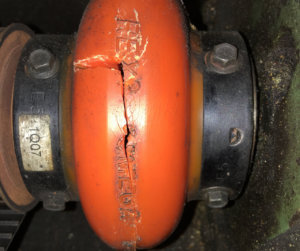We can do extensive multi-point inspections of all your rotating equipment, but sometimes the biggest problems are the easiest to find.
To put it simply, the goal of a motor maintenance program is to stop problems before they occur! Preventive motor maintenance on a regular basis can help prevent motors to fail and thus, prevent unexpected production stops. That’s where WE come in!
With this customer, Decatur Industrial works with them to run a motor maintenance program. Our techs are trained to check for overheating of motors, bearing failures, and many other potential issues.
 In this picture you see a cracked coupling. Our technician spotted this on a schedule walk-around. We were able to avoid this near failure as well as safety issue. It could have sent debris or coupling pieces flying.
In this picture you see a cracked coupling. Our technician spotted this on a schedule walk-around. We were able to avoid this near failure as well as safety issue. It could have sent debris or coupling pieces flying.
The customer was able to avoid a failure (and potential safety incident) and have it replaced quickly.
 Decatur Industrial is pleased to announce that Steven Leinard has the joined the team as the Manager of Quality and Engineering. This is an integral role in serving out our promise of exceptional service and quality to customers.
Decatur Industrial is pleased to announce that Steven Leinard has the joined the team as the Manager of Quality and Engineering. This is an integral role in serving out our promise of exceptional service and quality to customers.